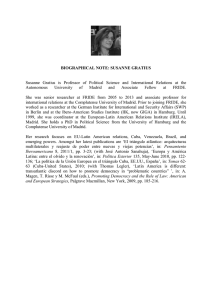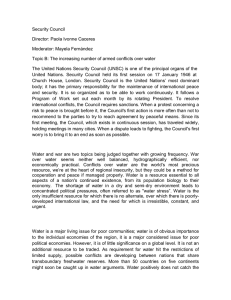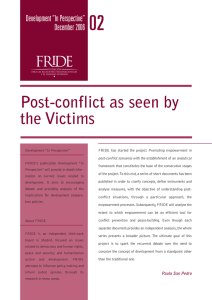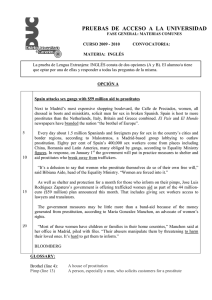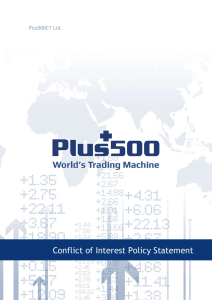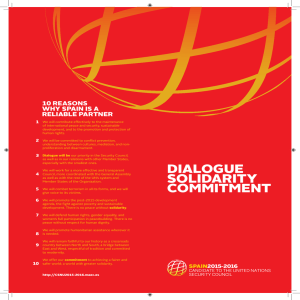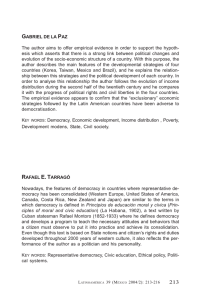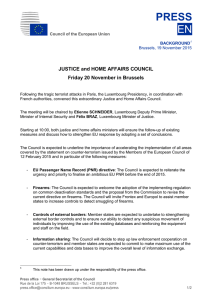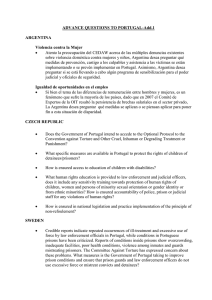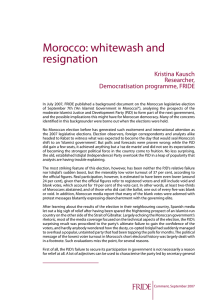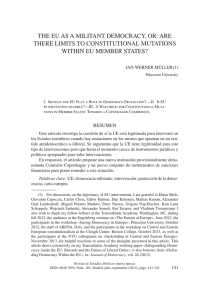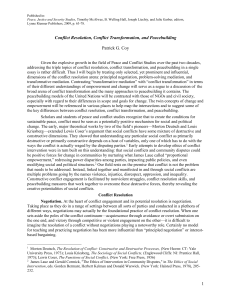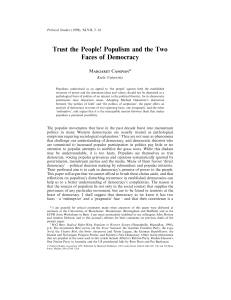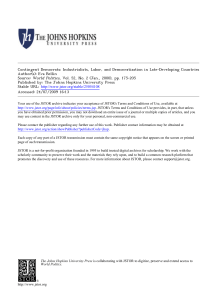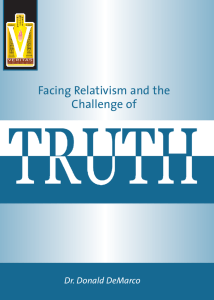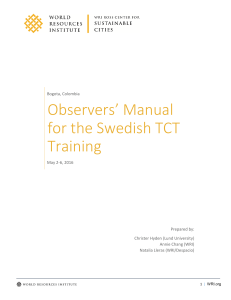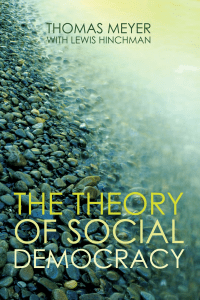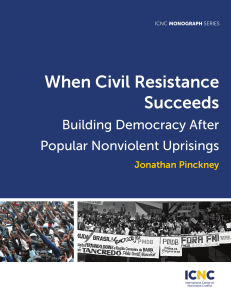The responsibilty to contribute
Anuncio
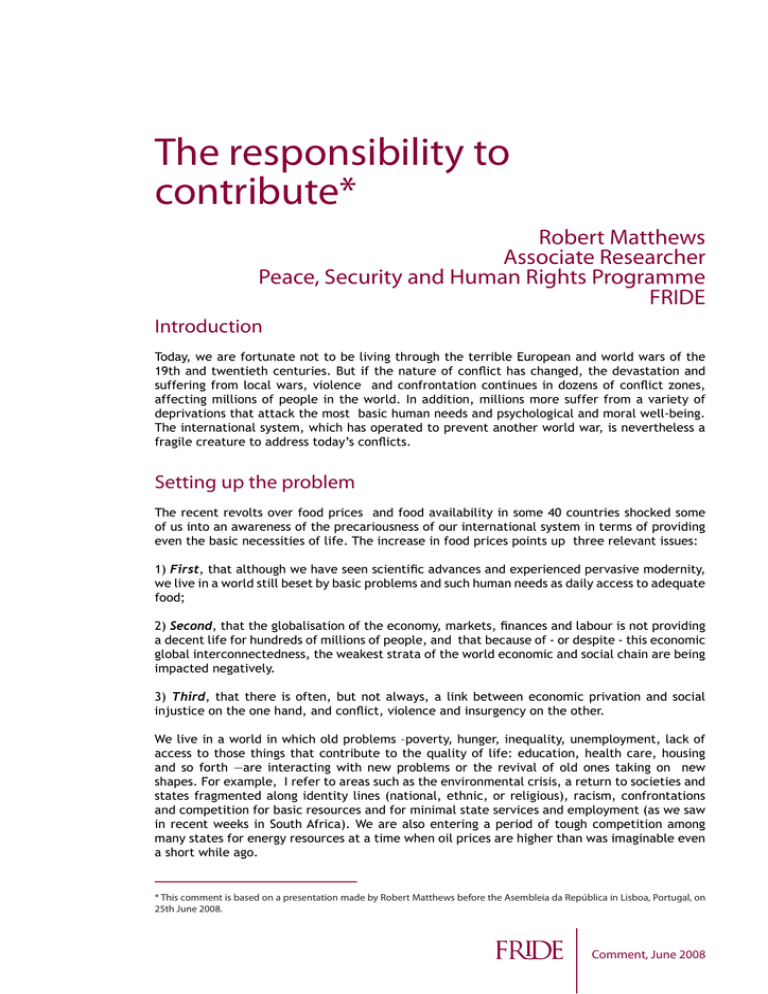
The responsibility to contribute* Robert Matthews Associate Researcher Peace, Security and Human Rights Programme FRIDE Introduction Today, we are fortunate not to be living through the terrible European and world wars of the 19th and twentieth centuries. But if the nature of conflict has changed, the devastation and suffering from local wars, violence and confrontation continues in dozens of conflict zones, affecting millions of people in the world. In addition, millions more suffer from a variety of deprivations that attack the most basic human needs and psychological and moral well-being. The international system, which has operated to prevent another world war, is nevertheless a fragile creature to address today’s conflicts. Setting up the problem The recent revolts over food prices and food availability in some 40 countries shocked some of us into an awareness of the precariousness of our international system in terms of providing even the basic necessities of life. The increase in food prices points up three relevant issues: 1) First, that although we have seen scientific advances and experienced pervasive modernity, we live in a world still beset by basic problems and such human needs as daily access to adequate food; 2) Second, that the globalisation of the economy, markets, finances and labour is not providing a decent life for hundreds of millions of people, and that because of - or despite - this economic global interconnectedness, the weakest strata of the world economic and social chain are being impacted negatively. 3) Third, that there is often, but not always, a link between economic privation and social injustice on the one hand, and conflict, violence and insurgency on the other. We live in a world in which old problems –poverty, hunger, inequality, unemployment, lack of access to those things that contribute to the quality of life: education, health care, housing and so forth —are interacting with new problems or the revival of old ones taking on new shapes. For example, I refer to areas such as the environmental crisis, a return to societies and states fragmented along identity lines (national, ethnic, or religious), racism, confrontations and competition for basic resources and for minimal state services and employment (as we saw in recent weeks in South Africa). We are also entering a period of tough competition among many states for energy resources at a time when oil prices are higher than was imaginable even a short while ago. * This comment is based on a presentation made by Robert Matthews before the Asembleia da República in Lisboa, Portugal, on 25th June 2008. Comment, June 2008 2 The problem is that at the human level, the level of the majority of people, the system is not working. The problem is also that our leaders wasted the transition period between the end of the Cold War (when a world of opportunities was open to them) and the beginning of a new uncertain order-- when everything was changing. Attention could have shifted to the various political, religious, economic and social problems of the developing world without the prejudice and distortion of the bipolar East-West rivalry—without that frozen tableaux of enemies that distracted our attention and paralysed action for nearly half a century after World War II. The enemy now is not ideological so much as the very conditions in which the majority of the world’s population live: which can be summed up as inequality and a general lack social justice. This includes physical afflictions such as disease, hunger and resource deprivation, as well as economic and social barriers impeding the achievement of a degree of well-being: illiteracy, lost educational opportunities, political exclusion, religious, ethnic and sectarian discrimination, social and economic inequality. Of course, all these existed during—indeed predate - the cold war, but now they should have been moved to the front burner. Instead, our attention has been distracted again, first by what in the US was called narco-terrorism, and then later by international Islamist/jihadist terrorism –which have slid in to occupy the space left by communism during the cold war. This was accompanied also by an all too familiar readiness to apply a military response - what some have called the “the romance of the ruthless.” This is the context of the problem that we are raising here: the old difficulties are still there, and the food crisis is demonstrating that they are being reborn with new strength, while the international system –or the elite politics of relationships between states and the global economy —is evolving swiftly, but with little sign of being able to deal with these problems. The social, economic and cultural challenges we face today in the developing world represent a recrudescence, with new and more pernicious consequences, of the old problems of poverty, international conflicts over resources, and the disintegration of weak societies that we saw in the 1980s and 1990s. And yet we have still to tackle these challenges adequately. Indeed, the obsession with terrorism as the unique and primordial threat of the current century has already had a deleterious effect in the developing world. Placing counterterrorism at the centre of national security has effectively subordinated the structural and ultimately more dangerous problems of 1) ethnic and religious conflict 2) mismanagement of the environment 3) the struggle over resources and 4) grinding poverty and the persistent marginalisation of the world’s peoples. These problems constitute the roots of present and future conflicts and, left unattended, may entail terrible future political and economic consequences for us all. Consequences: what are the consequences that we can already glimpse? 1. First, there is global instability: In addition to these revolts over food prices, we see mass migrations, conflicts in some 30 countries, areas of intense conflict - Iraq and Afghanistan, Pakistan, the Middle East and sub-Saharan Africa - millions of displaced people and refugees (Sudan), to cite only some examples. In addition, there is the spread of radical jihadism and that late 20th-21st century phenomenon: stateless and decentralised terrorism like that of Al Qaeda, and its counterpart - the US Global War against Terrorism. 2. Second, there is less room for manoeuvre for the US and Europe: less power for the West in conflicted areas of the world and, as we are seeing in Iraq and Afghanistan, less ability to impose Western will. The Middle East is another example. The US has lost the credibility to be an honest broker and Europe, which should be playing a more active role, subordinates its natural interest there to the US-transatlantic relationship. At least for now, Europe seems to have entirely lost the initiative in the region. The situation has not been helped either by the anti-Lisbon treaty vote in Ireland. The responsibility to contribute Robert Matthews 3 3. Third, the multilateral system is under assault. This system, which was organised after World War II and synthesised by the UN, has been seriously - but not irreparably - weakened by Washington’s arrogant unilateralism and its attitude of “you’re either with us or with the terrorists” (though admittedly the pendulum may be swinging back in the wake of the disaster in Iraq and escalating violence in Afghanistan). But Europe has also played its role in undermining this international system of consultation and consensus in the effort to prevent conflict. What is more, the European Union has to deal with its own internal crisis of credibility regarding its common project. This, despite the fact that the EU’s project embodies common core values such as international cooperation, collaboration, solidarity among disparate parties, integration and unity without losing diversity, democracy with an effort toward social equality and respect for human rights. There are countertendencies that diminish this model, including internal fragmentation, chauvinistic polices toward immigrants, and a vision of private liberties over the collective good. We should be concerned that this model may cease to be an example for anyone in the developing world. Special attention must be paid to the issues of peace and conflict in European foreign polices. In the current scenario the possibility that there will be a new wave of armed conflicts is very high. These may assume new and different forms. For example, irregular guerrilla warfare among state actors and non-state actors confronting each other in dynamic and changing ways- as we have seen in Lebanon. Violent urban conflicts involving millions of jobless young people, the phenomenon of gang violence from San Salvador and Guatemala City to Liverpool, the streets of Moscow and the alleys of the Palestinian territories. There are conflicts among poor residents and poor immigrants as we have seen, for example, in South Africa. We are witnessing conflicts over natural resources as well as more traditional wars over territorial control and national liberation movements as in Palestine, which include resource conflicts over land and water rights--many far from being resolved. These conflicts inevitably result in violations of human rights and thus the possibility of more humanitarian interventions and perhaps more peacekeeping forces under the general principle of the “Responsibility to Protect”. Why should Europe/Portugal care? What can we do? What instruments lie at hand? Europe, more so than Washington, continues to stress conflict prevention rather than after-thefact reactions to fragile, failing and failed states – the former focus is clearly a more complex and challenging proposition. More so than the US, Europeans tend to address the issues of poverty and inequality more directly as root problems rendering security a somewhat more contingent element. This emphasis on development, irrespective of security, albeit modified in the post-9/11 world, perpetuates a distinction that was also true in the Cold War. Within Europe, Denmark and Sweden have been more oriented toward development aid than, say, Spain and Portugal. Development aid is ultimately more important than achieving ceasefire or peace agreements because of the high recidivism rate (return to conflict). Yet, overall, Europe has followed all too closely the US example of concentrating on the problem of terrorism and national security rather than development. Europe has been dominated too much by the guidelines set forth by the US in defining its global war on terrorism and in its focus on those countries which seem to represent the greatest terrorist threat, i.e. those in the Middle East. Half of EU money in Iraq is going toward the military and half toward multilateral aid. Finally, despite a growth in these fragile/failed states which now number approximately 50, and a ratcheting up of interest and attention, there is not much evidence overall of increased European budgets in the area of aid to failed states. Comment, June 2008 4 Europe certainly essays and promotes a modern, reasonable, (if I may use the world “civilised”) democratic model. It displays its good face: promoting democracy and the defence of human rights, contributing modestly to peacebuilding and human security and offering praise for the Millennium Goals (the UN initiative to reduce poverty). But it must do more. Of course, Europe should balance ideals with capacity, its political vision with the instruments of disseminating it. An effective approach to conflict zones would combine feasibility with inspiration. While we may have to resort to coercion when and where it is absolutely necessary, there must always be an openness to negotiation—as John F Kennedy once famously said: “We should never negotiate from fear but never fear to negotiate”. There must also be an understanding of local needs, and a willingness to address the more complex job of reconstruction and state-building. In the case of Afghanistan, military policy has ended up short-changing even security because the US-led NATO effort ignored basic local needs. Tactics and strategies need to be aligned. If the overarching strategy is to win over the hearts and minds of the combatants, then aerial bombing with collateral civilian damage is probably a poor tactic. In Europe we must recognise the potential for hypocrisy. There is the selfish and self-serving tendency to close the gates on the Barbarians (that is, the immigrants searching for a better life) while trying to capture all the possible opportunities in the world from which those immigrants have come. In the case of the much applauded Millennium Goals, the money has been slow to come and the industrially developed countries have been slow to comply. Europe and the US still play the dual role of accommodating the reality of competition with the other powers whose behaviour does not necessarily mirror the EU (USA, China, Russia) while repeating the lofty rhetoric of democracy, human rights etc. The question is, will we in the West awaken to these contradictions too late? Regarding the use of peacekeeping and peacebuilding to address conflict situations, a general comment needs to be made: on the Coercion v. Attraction axis, Europe can advocate sliding toward the latter. The contribution Europe/Portugal can make to the world of conflict resolution and peacebuilding is to project the European model and the use of so-called soft-power instruments of persuasion rather than coercion. Europe and the EU may feel they lack power in foreign affairs, but power is the ability to get the outcomes one wants, and in today’s world, as the last seven years have shown, the contexts of power are complex: not just military but economic, political and moral as well. Often it depends on the WILL to assert these elements of what the US academic Joseph Nye calls “soft-power”. This includes especially the attraction, credibility and legitimacy of the European model: a limited free market economy with state-guaranteed social justice and social security to soften the rough edges of capitalist inequality. Europe’s ultimate power in international affairs rests on this model and the concomitant recognition of non-military aspects of peacebuilding. The world is changing The US appears-- at least at this conjuncture-- to be in economic distress, if not weakened for the intermediate term; China and India are certainly on the rise; Russia is back with political and military force and its geopolitical and economic interests (the latter especially through its oil and gas resources) and its influence expanding accordingly. The Emerging Nations (for example, IBSA: Brazil, India, South Africa) are increasing their economic and diplomatic clout in their zones of influence and carrying more weight in multilateral negotiations like the World Trade Organization (WTO). There are shifts in the economic system toward more decentralisation, regional alliances, and new regional hegemonies (for example China in its sphere of influence), Iran in the Persian Gulf and the Middle east. The global economic system (including trade and finance) seems barely controllable. Global privatisation is preventing coordinated responses. For example, today, in facing the crisis of food shortages or intolerably high prices, the competition among buyers, sellers, speculators and those who need the food is such that multilateral organisations’ calls for coordination go unheeded. The responsibility to contribute Robert Matthews 5 At the same time, there is a revolution of rising expectations in a globalised world of communication, which feeds scepticism - and even outright hostility - toward the old politics and traditional parties. The words of former national security adviser, Zbigniew Bzrezinski, could easily be addressed to Europe: “We need to face squarely a centrally important new global reality: that the world’s population is experiencing a political awakening unprecedented in scope and intensity, with the result that the politics of populism are transforming the politics of power. Indians, peasants and workers in Latin America, like their counterparts in Asia and the Middle East, are increasingly defining their goals in opposition to policies of the developed countries—especially the US.”1 What role, then, for the EU and the USA? While we live in a world of competing powers, we also need to recognise that security is not only military, but also – most importantly - includes other aspects: human security, which in turn involves work security, food security, health security, gender security, environmental security, the right to access to goods guaranteed by the state and…. ultimately, by the international community. In this sense, nations like the US and political systems like that of the EU, Canada, Australia, and increasingly China, Russia and the merging powers of Brazil, South Africa , India, all have a serious responsibility. These goals are inherent to a durable peacebuilding process. As with counterinsurgency, the first objective in peacebuilding is to gain control of the population by winning their support. Immediately, that may mean providing security by working in tandem with local police and security forces. But over the long haul, only by addressing head-on the social and economic issues can we expect to dry up the swamp of violence and terror that threaten people in conflicted areas. Those who sympathise and join violent groups are often motivated by a basic desire to achieve a measure of social and economic justice in their lives. Acting in concert with local populations to ensure their dignity and well-being creates a solid foundation for building peace. Any campaign to promote freedom and democracy to combat violence and terrorism and sink the foundations for conflict resolution—an approach usually applauded and abetted by the industrialised Western world-- must include more than just political democracy. Elections without social and economic justice will not solve the problems of many countries and are incapable of resolving the problem of failed states, ethnic cleansing, or internecine violence. Our general responsibilities All this is apparent but we need to reflect upon it. We have to take action before these problems spin out of our control and become insoluble (as seems to be the case with narcotics production and trafficking and climate change). We already have the tools at hand: international cooperation, humanitarian aid, programs of the national (European) governments, multinationals, NGOs, etc. We have the funds to channel emergency and long-term assistance. We have diplomats and experts to mediate crises, promote peace and help solve international conflicts. But all this should be rethought and reconsidered in a broad context . For example, aid should be seen in relation to investments and capital flows—legal and illegal. It makes no sense to give aid to country X and allow private and public European investments to shore up dictatorships, human exploitation and environmental destruction in country Y. We need to see if we have created systems of self-serving, revolving-door aid that provide returns to Europe, promote and assist our NGOs and salve our consciences rather than furnishing much needed help to those requesting it - an accusation that many Afghans, for example, now make with regard to Western aid. 1 The American Interest, vol. I, No. 1, Autumn 2005, p. 37. Comment, June 2008 6 Europeans should have concrete strategic plans and not simply throw aid around in a disparate, inconsistent, uncoordinated fashion. What is more, we should remember that each country by itself cannot do this work. Thus, an essential concomitant is to reinvigorate, reinforce and make more effective the multilateral system: this includes not surrendering hope that European integration will strengthen the UN and other regional bodies like the Organisation of American States (OAS) and the African Union - and, if I may add, rejecting the proposal of US presidential candidate McCain for a League or Concert of Democracies. Such a League would be dominated by the US and could ultimately undermine the UN and other multilateral institutions - perhaps its real goal? Responsibilities USA-EU An interesting and important period is opening up. Presidential elections in the US may bring to the White House a president who represents a political, social and generational change for that country (the increasing influence of people of colour and minorities, including AfricanAmericans who just forty years ago were still struggling for their civil rights) and, very likely, a turn to the notion of US soft power in international relations. After a decade of shame, the US could now reintegrate itself into the world community with less compulsion to rule imperiously, becoming one more nation—a powerful one—but one among many nevertheless. Undoubtedly it will remain, despite the internal economic crisis, a militarily strong and still economically powerful nation, with the capacity to resolve its internal problems and cooperate with the world in resolving its myriad problems. It is a moment of mutual collaboration—including with non-European Union countries (like Norway and Canada) as well as with the emerging powers and others which would strengthen the UN. This would be an opportunity to reflect on how to collaborate better in peace initiatives. These include conflict prevention, crisis management, post-war reconstruction, and state- building in fragile states. At the same time, the US in the past five years has evolved a more level-headed, inclusive policy toward “the old Europe” - the epithet with which US Secretary of Defence Donald Rumsfeld insulted Western Europe. European opinion now broadly rejects the Bush administration’s muscular pursuit of geopolitical interest-- packaged as a kind of 21st century redemptive idealism. Europeans are virtually immune to the heretofore tediously promoted US moralism which culminated in the notion of “democracy by coercion” rather than by example. Public opinion in Portugal and much of Europe today senses a moral obligation to spread the elements of “soft power”-- a more hopeful and compelling vision of democracy and European social ideals. This in turn is seen as the best guarantor of peace and national security. It is the moment to open a dialogue with Russia and China, not just in the language of national security and NATO objectives, but in the form of a pragmatic discourse based on common interests. The same is true with Iran, where we need to lower the international temperature. More threats will only harden its position further. Instead, there should be a regional dialogue with Iran’s neighbours and allies to see if common ground can be found for agreement. It is also time for serious reflection on policies of support for governments that, far from providing stability, constitute a source of instability and pose a major danger to their regions. Many in Europe see this to be the case with the recent hardline governments of Israel. Despite being democratic and acting as an ally in the effort to counter terrorism, Israel is seen as an obstacle— especially with regard to its settlement policies-- to resolving the seemingly insoluble conflict with Palestine and not helpful when it comes to resolving the Iranian nuclear dispute because of its aggressive response to Iranian hostility. The dialogue should be ongoing, pragmatic, and undertaken at the official government-togovernment level with multilateral institutions and among civil societies. It is a time to seize opportunities, and we should not let them escape us, as happened after the cold war. The responsibility to contribute Robert Matthews 7 The military power of the US is overwhelming: the US represents nearly half of world defence expenditures. Today, there are some 500,000 US soldiers on active duty with 400,000 troops deployed world-wide in nearly 135 countries—that is, in 70 percent of the world’s countries. Their duties range from combat operations, to peacekeeping, to training with foreign militaries. In addition, there are as many as 100,000 civilian contractors doing military jobs and approximately 20,000 private security forces in conflict situations from Iraq to Colombia. Beneath this overwhelming military power in the hands of one country, the world is complex and multipolar. Transnational relations include areas of concern to all, not least of all Europe-- and Portugal : conflicts create ripple effects. Resource wars, ethnic/religious conflicts, struggles for selfdetermination and struggles for social justice, pandemics, drug cultivation and trafficking and international terrorism are not unrelated to energy security, climate change, sound immigration policies, counterterrorism and counternarcotics and anti drug abuse strategies. In short, in today’s globalised world, insecurity anywhere may impact security- to one degree or anothereverywhere. Thus, what happens somewhere can affect us all. Yet we are finding that we can influence, but not control, other parts of the world. But we are also finding that military power is a small part of the solution; there are other tools in the West’s arsenal which may in the end prove more effective in forging peace than blunt repression or violent confrontation—rapiers of nuanced and contextualised aid rather than the bludgeon of military force. Goals such as democracy promotion, the rule of law and human rights, for example, are better achieved by soft power. The US policy of “coercive democratisation” has revealed its limits as the Bush Administration has found in Iraq. In fact, with erosion of US credibility, the broad effort of democratisation- especially in the Muslim world-- has been set back because of its identification with what is perceived as the flawed democracy of the US, its contempt for international law and human rights record abroad. Europe needs to think more of using its ideas to attract and less of following the Bush administration´s example of repelling with force those who don’t hold the same worldview. Specifically, these include applying the classic instruments of soft power to conflict and post-conflict situations. Examples include multi-tiered communication: public diplomacy, broadcasting, educational and cultural exchange programs, NGO-to-NGO cooperation and dialogue within civil society—FACE-TO-FACE CONTACTS. Also included are: development assistance, disaster relief and security assistance incorporating military-to-military training, aid for police and judicial reform. But these need to be coordinated to be truly effective. The best example of the West’s failure to provide sufficient and coordinated assistance within an overarching strategy is Afghanistan. At the moment, the notion of soft power and its uses is a difficult proposition to embrace politically in the US—more so than in Europe. Since the shock of 9/11, the Bush administration has masterfully played the fear card for internal political gain while exporting fear and anger rather than our more traditional values of hope, optimism, and faith in the progress of humanity. Guantánamo has become a more powerful global icon than the Statue of Liberty. That may change after November. In the light of the recent failures of “hard power”, the US may now be ready to embrace the concept of “soft power” strategies. At any rate, Washington must restore its alliances, partnerships and multilateral institutions. Many have fallen into disarray in recent years of US unilateralism and a renewed investment in these institutions will be essential. BUT EUROPE SHOULD BE PREPARED FOR THIS SHIFT AND READY TO SHIFT ITS OWN APPROACH WHICH HAS FOLLOWED THE LEAD OF USA ALL TOO CLOSELY SINCE 2001. Comment, June 2008 8 Conclusion Europe, like the US, should be investing in addressing conflicts through the establishment and proliferation of a form of social democracy - that is, political freedom and representative government, together within local, human security, social justice and reasonable opportunities for material progress. In the end, if the pursuit of democracy as an alternative to conflict is to be more than window dressing to disguise otherwise transparent hegemonic interests, it must aim for more than periodic elections. Above all, any true definition of democracy must incorporate a deeper structural definition in which the idea of social justice is embedded. That includes serious global efforts to reduce poverty, economic inequality and marginalisation, and promote balanced, integrated and environmentally sound growth. What all of us should be striving for, therefore, is “Sustainable” Democracy —i.e. viable and long range—which affords ongoing economic development, political pluralism and, ultimately, a sustainable, human - not just national security-- goal too often sought only through military deployments. A road to peace paved by war and destruction, however superficially successful, needs to be challenged for the short-lived chimera that it is. Force may be necessary in given circumstances. But the key here is to create solid foundations for an integrated, legitimate and functional state—the end product of the effort to construct peace and construct or reconstruct fractured states. These foundations can only be laid properly and soundly through an array of coordinated non-military means. Europe has the political culture and the historical and ideological framework to respond to the complexity of the challenge of modern conflict with an equally complex, but integrated and coordinated, set of strategies. In this regard, Portugal, as part of a European optic on conflict and peacebuilding, can help lead the way. The responsibility to contribute Robert Matthews 9 Los comentarios de FRIDE ofrecen un análisis breve y conciso de cuestiones internacionales de actualidad en los ámbitos de la democracia, paz y seguridad, derechos humanos, y acción humanitaria y desarrollo. Todas las publicaciones de FRIDE están disponibles en www.fride.org Las ideas expresadas por los autores en los documentos difundidos en la página web no reflejan necesariamente las opiniones de FRIDE. Si tiene algún comentario sobre el artículo o alguna sugerencia, puede ponerse en contacto con nosotros en [email protected] Fundación para las Relaciones Internacionales y el Diálogo Exterior C/ Goya, 5-7 pasaje 2ª - 28001 Madrid - Telf: 91 244 47 40 - Fax: 91 244 47 41 - E-mail : [email protected] www.fride.org Comment, June 2008
